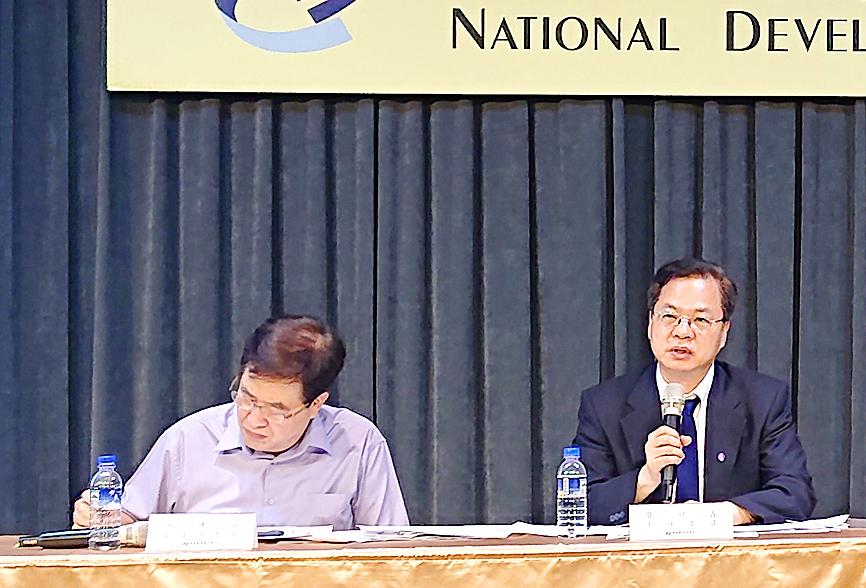The National Development Council (NDC) yesterday unveiled a four-year economic development plan with an aim to pursue GDP growth of 2.6 to 3.4 percent backed by 5G wireless communication, artificial intelligence and technology supply chain realignment.
The council mapped out economic goals that also seek to bring the jobless rate down to 3.5 to 3.8 percent, with increases of 1 to 1.5 percent in consumer prices.
“Different government agencies will jointly pursue the goals once the Cabinet gives its approval,” NDC Minister Kung Ming-hsin (龔明鑫) said.

Photo: CNA
While China and the US vie for global technology leadership, Taiwan would press ahead with digital innovation and deepen its participation in regional economic integration, the council said.
The government has offered favorable financing and tax terms to help expedite the supply chain realignment and the creation of a new industrial ecosystem, Kung said.
COMING HOME
Investment pledges of more than NT$1 trillion (US$33.8 billion) from companies returning from China to cope with the COVID-19 pandemic and US-China trade tensions would fuel economic growth in the coming years and help build Taiwan into a global high-tech hub, he said.
From semiconductors to servers, and from data centers to critical electronic components, the related sectors have been benefiting from a boom in demand for remote learning and working arrangements amid the outbreak, Kung said.
“The virus will remain a threat to the global economy until the development of vaccines,” Kung said, adding that vaccines would be developed eventually.
In the meantime, the government would continue to shore up the “five plus two” industries and take steps to overcome expected declines in consumer activity due to Taiwan’s fast-growing aged population, the council said.
An NDC committee proposed a public works budget of NT$141.46 billion for next year to prop up the nation’s economy, Kung said.
Public works intended to improve the transportation infrastructure account for 47.36 percent of the budget, followed by environment enhancement spending at 22.17 percent, and funds to protect forestry and water resources, as well as disaster prevention at 12.46 percent, the council said.
As of last month, government agencies scored an improvement of 3 percentage points in executing public works budgets for this year, the council said, adding that all departments would seek to raise the execution rate to 95 percent toward the end of this year.

KEEPING UP: The acquisition of a cleanroom in Taiwan would enable Micron to increase production in a market where demand continues to outpace supply, a Micron official said Micron Technology Inc has signed a letter of intent to buy a fabrication site in Taiwan from Powerchip Semiconductor Manufacturing Corp (力積電) for US$1.8 billion to expand its production of memory chips. Micron would take control of the P5 site in Miaoli County’s Tongluo Township (銅鑼) and plans to ramp up DRAM production in phases after the transaction closes in the second quarter, the company said in a statement on Saturday. The acquisition includes an existing 12 inch fab cleanroom of 27,871m2 and would further position Micron to address growing global demand for memory solutions, the company said. Micron expects the transaction to

Nvidia Corp’s GB300 platform is expected to account for 70 to 80 percent of global artificial intelligence (AI) server rack shipments this year, while adoption of its next-generation Vera Rubin 200 platform is to gradually gain momentum after the third quarter of the year, TrendForce Corp (集邦科技) said. Servers based on Nvidia’s GB300 chips entered mass production last quarter and they are expected to become the mainstay models for Taiwanese server manufacturers this year, Trendforce analyst Frank Kung (龔明德) said in an interview. This year is expected to be a breakout year for AI servers based on a variety of chips, as

Global semiconductor stocks advanced yesterday, as comments by Nvidia Corp chief executive officer Jensen Huang (黃仁勳) at Davos, Switzerland, helped reinforce investor enthusiasm for artificial intelligence (AI). Samsung Electronics Co gained as much as 5 percent to an all-time high, helping drive South Korea’s benchmark KOSPI above 5,000 for the first time. That came after the Philadelphia Semiconductor Index rose more than 3 percent to a fresh record on Wednesday, with a boost from Nvidia. The gains came amid broad risk-on trade after US President Donald Trump withdrew his threat of tariffs on some European nations over backing for Greenland. Huang further

HSBC Bank Taiwan Ltd (匯豐台灣商銀) and the Taiwan High Prosecutors Office recently signed a memorandum of understanding (MOU) to enhance cooperation on the suspicious transaction analysis mechanism. This landmark agreement makes HSBC the first foreign bank in Taiwan to establish such a partnership with the High Prosecutors Office, underscoring its commitment to active anti-fraud initiatives, financial inclusion, and the “Treating Customers Fairly” principle. Through this deep public-private collaboration, both parties aim to co-create a secure financial ecosystem via early warning detection and precise fraud prevention technologies. At the signing ceremony, HSBC Taiwan CEO and head of banking Adam Chen (陳志堅)